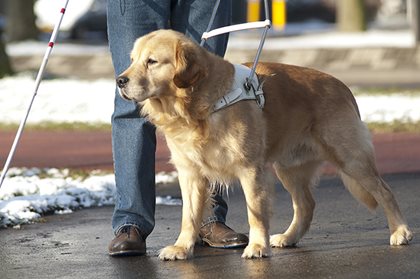Thursday September 15, 2016
 What are service animals?
What are service animals?
Service dogs can help individuals with a variety of disabilities enjoy a greater quality of life and assist in performing daily tasks. What happens when your HOA's policies and the need for a service animal conflict? The short answer is, if a service animal is needed and used as outlined by the Americans with Disabilities Act (ADA), the community cannot prohibit it.It’s also clear that the presence of a service animal often brings up important questions – not only when it comes to ADA compliance and access to public spaces, but also when considering fairness to other residents and their guests. It’s critical that associations remain compliant with the ADA, and also that they avoid situations that may limit access to individuals who are acting within their rights.
“There are many qualifications and provisions within the ADA’s definition of what constitutes a service animal, and what accommodations must be made for it,” said Cyndy Pirrera, vice president, high-rise, at FirstService Residential. “The more you know, the more likely you’ll be able to ensure a fair environment for all of your residents and guests.”
The following provisions and guidelines will clarify information about service animals and the rights of individuals with disabilities in your community.
What to know about service animals in your community
-
Service animals are clearly defined.
According to the ADA, only dogs can be designated as service animals. The dog must also be trained to perform certain specific tasks to assist its owner. Dogs can be trained to provide an array of assistance services. Examples include canines that assist the blind, provide alert functions for those who are deaf, pull wheelchairs, remind people when to take their medication and calm those diagnosed with Post Traumatic Stress Disorder. The critical distinction is that these animals serve essential functions and are not there to act as pets. By the ADA’s definition, animals who provide comfort or emotional support do not fulfill the requirements of service animals. If your association or building prohibits pets, you may not be obliged to accommodate animals who serve in that role.
“The ADA has many provisions and definitions when it comes to service dogs and guide dogs,” said Phil Pool, vice president at FirstService Residential. “It’s incumbent upon us, as a leader in community association management, to understand these regulations so we can act fairly for all of our residents and guests.”
-
Know what you can and can’t ask.
When you see a resident or a guest with a dog, especially in a building where pets are not permitted, your immediate inclination is often to question whether the animal is a pet or a service dog. That’s understandable – but be careful when questioning a dog’s status or purpose. There are only two questions you can ask if the dog’s purpose isn’t obvious:
- Is the dog a service animal required because of a disability?
- What work or task does the dog perform?
It is a violation of the ADA to ask about any individual’s specific disability, or to require any formal medical documentation to justify the animal’s presence. Never ask for any demonstration of the dog’s capabilities or proof of its training. The ADA requires that animals be trained, but that training can be done by the owner.
- Is the dog a service animal required because of a disability?
-
You can request removal of an animal, but only in limited circumstances.
The ADA doesn’t require that all animals be accommodated at all times. ADA guidelines stipulate that the dog must be leashed, tethered or under strict verbal command at all times. Even if it is a service animal, you can request its removal if the handler doesn’t meet these requirements. If the dog is not housebroken, you are not obligated to accommodate it either. If the animal is a service or guide dog, you must allow it to stay, even if other people are allergic to it. If you are in this situation, you must do your best to provide accommodations for both people, even if that means separate locations. You are not permitted to ask either person to leave the premises at any time.
-
Waive the fees.
It is prohibited to charge fees for a service animal, regardless of your association’s pet policy. Owners of service animals cannot be charged any additional fees that are not charged to people without pets. Remember, under ADA rules, a service animal cannot be classified as a pet.
-
Know what documentation is required.
As mentioned above, it is prohibited by the ADA to ask a disabled person for documentation which proves that their dog is a service animal. However, many states require licenses and registration for service animals, and it is within your rights to ask for that.